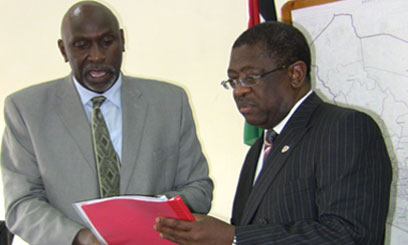NAIROBI, Kenya, Aug 20- The Commission for the Implementation of the Constitution (CIC) on Saturday requested for a 30-day extension of time to scrutinise and polish the Public Finance Management Bill.
Through a statement, CIC Chairman Charles Nyachae argued that Kenyans risked passing a shoddy Bill if the August 27 deadline was not extended.
Mr Nyachae said that there was need for more time to streamline the Bill so that it augurs well with the Constitution, adding that his commission had already communicated the request to Attorney General (AG) Amos Wako.
The CIC wants the AG to move a motion, seeking the extension, in accordance with Article 261 (2) of the Constitution.
“It is now clear that this Bill cannot be completed and passed by Parliament by August 26 without undermining its quality and compromising the values required by the Constitution,” read Mr Nyachae’s statement.
The Ministries of Finance and Local Government have been engaged in a tussle over the crucial Bill, which has delayed its implementation. Although the two parties were, last month, asked by both the CIC and the Constitution Implementation Oversight Committee (CIOC) to iron out their differences, no consensus has been reached.
Treasury insists that the task force on devolution (which falls under the Ministry of Local Government) should not draft any bills touching on finances as it lacks the expertise. Treasury also felt that the taskforce had overstepped its mandate by drafting finance bills without consulting it.
On July 21, Treasury appeared before the CIOC and raised fundamental issues in the County Government Financial Management Bill (which had been submitted to the CIC by the devolution taskforce) noting that it made references to non existent articles.
Kamau Thugi, a consultant at the Ministry of Finance, also noted that the Bill was a carbon copy of the Municipal Finance Management Act (2003) of South Africa.
Mr Thugi revealed that articles 154, 156, 157 (2) and 181 (2) were cited in the Bill but did not exist while articles 104 and 105 were directly copied from articles 85 and 86 (respectively) of the South African Act.
“Now if there are so many errors in such an important document which has been submitted to the CIC to become a law we wonder whether there has been enough thinking behind what is actually the substance of what has been submitted,” quipped Mr Thugi at the time.
The Finance ministry further accused the taskforce on devolution of circumventing its role by drafting the finance bills without consulting it.
“The point of the matter is that you would want to ensure that you are relying on the doctor who can give you the correct prescription and not someone who was just walking around the hospital and heard the doctor saying something about your illness,” quipped Permanent Secretary Joseph Kinyua.
Treasury also said that it had already drafted a comprehensive Public Finance Management Bill to tackle devolution and finances.
However the devolution taskforce, which also appeared before the CIOC maintained that it had the authority to provide the legal framework on all issues that touch on devolution and finances.
Other than the County Government Financial Management Bill, the task force had also submitted the Intergovernmental Fiscal Relations Bill to the CIC, the Attorney General and the Finance Ministry.
Devolution taskforce Chairman Mutakha Kangu accused Treasury of sabotaging the process by refusing to cooperate on the Bills.
While he argued that it was necessary to have separate laws touching on the issue of devolution and finances, the Finance ministry called for one wholesome law.
Taskforce member Murkomen Kipchumba said it would be safe to have the laws separated in order to minimise any conflicts that could come up in the future.
“A pastor was once preaching and he said ‘I would rather act as though there is a heaven even when it might not be there, than act as if there’s none and find out later that there is.’ So it would be better if we act as if we need the two separate bills and later realise that we don’t need them,” he said.
However the CIOC felt it would be better to have one definitive Bill.
“My personal view is that it is better to have few Bills. I’m saying this from the experience I’ve had as a lawyer and as a legislator. When you have too many laws it is difficult to know where what is,” argued Mr Abdikadir.
Meanwhile the Cabinet met on Saturday and approved four Bills for tabling in Parliament among them the Urban Areas and Cities Bill 2011, the Environment and Land Court Bill 2011, the Kenya Citizens and Foreign Nationals Bill 2011 and the Citizenship and Immigration Bill 2011.
The Cabinet also met on August 16 and 18 when it approved the Elections Bill, the Independent Ethics and Anti-Corruption Commission Bill 2011, the Power of Mercy Bill 2011 and the Kenya Heroes Bill 2011. MPs now have more than 10 Bills on their plate.










































